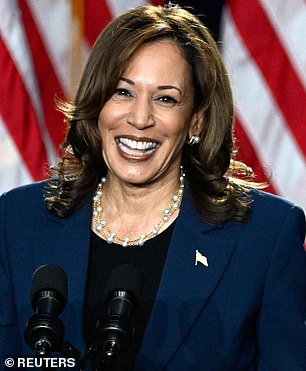Table of Contents
Trouble ahead?: Donald Trump warned there would be a 1929-style collapse if Kamala Harris won the White House
The panic is over, but despite what has happened so far, there are big bumps ahead for the rest of the year, bumps that could transform the elections in November.
U.S. stocks have recovered most or all of the ground they lost in the chaotic days earlier this month, and the S&P 500 index is near its all-time high for July.
Whenever a correction occurs, a drop of 10 percent or more, the market usually falls back a couple of times to test the bottom of the fall. And sometimes, less frequently, it heads into a bear market, a drop of 20 percent.
While this classification of corrections and bear markets is arbitrary, it provides a useful shorthand for characterizing recessions.
As you can imagine, people here are thinking about what happened in previous cycles, trying to calculate the odds of what might happen next. Drops after a correction are pretty straightforward. There’s almost always a second drop, often a third, but rarely a fourth. That’s why it’s easy to predict that a bumpy couple of months are ahead.
Bear markets are rarer. There have been 11 since 1956, the last five from 1990, 2000, 2007, 2020 and 2022, when the S&P 500 fell 20%, 49%, 57% (ouch!), 34% and 25% respectively.
The 2020 downturn, triggered by the exceptional circumstances of the pandemic, was mild, with prices falling for only one month and fully recovering six months later.
After the crash of 2007, coupled with the banking collapse of the following year, it took more than four years for stocks to return to their previous peak. What are the chances, then, of the current uncertainties turning into a bear market? The closest parallels to the current situation are those of 1990, 2000 and 2022.
The first of these was the result of a classic recession, that of the early 1990s, which swept across the developed world. The second was a response to the exuberance of the dotcom boom. The danger of a recession can be seen today, and it was growing fears that the US could face one that led to the chaos of two weeks ago.
Those fears have now been allayed, but they could return. The rise of the Magnificent Seven high-tech companies superficially resembles the dotcom experience, and although valuations are less extreme, there is much hope in share prices.
And what about the 2022 cycle, associated with the invasion of Ukraine, rising inflation and the corresponding rise in interest rates? If it turns out that inflation really does get over the top and interest rates fall in the coming years, that’s fine, but it’s hard to feel completely comfortable.
Writing from Washington, it’s impossible not to be aware of the political implications of all this. Donald Trump has called the market declines of two weeks ago the Kamala crash, and on Thursday he warned that a 1929-style crash would occur if she won the White House. This is nonsense, of course, since right now what’s happening in the stock market has nothing to do with the election.
In any case, stock prices have performed somewhat better under Democratic presidents, especially under Bill Clinton.
But if this turns out to be a close election, then it is plausible that what happens in the markets in the coming weeks could tip the balance.
There are two big questions. One is whether Trump is really seen as a pro-business candidate. Leaving aside support for Elon Musk, despite his status as the richest person in the United States, he represents himself and not the business world. If you look beyond that, there is ambivalence.
The other question is whether Harris understands the concerns of businesses and can sell what will be a higher-tax program, with greater protections for workers, as something that will ultimately create a stronger economy.
The message that markets have been sending throughout this strange summer is that the economy is strong enough to withstand whoever wins the White House. I am not predicting a fall for Kamala, or for Donald Trump, but I do think that confidence will weaken in the coming weeks.
DIY INVESTMENT PLATFORMS

AJ Bell

AJ Bell
Easy investment and ready-to-use portfolios

Hargreaves Lansdown

Hargreaves Lansdown
Free investment ideas and fund trading

interactive investor

interactive investor
Flat rate investing from £4.99 per month

Saxo

Saxo
Get £200 back in trading commissions

Trade 212

Trade 212
Free treatment and no commissions per account
Affiliate links: If you purchase a product This is Money may earn a commission. These offers are chosen by our editorial team as we believe they are worth highlighting. This does not affect our editorial independence.

